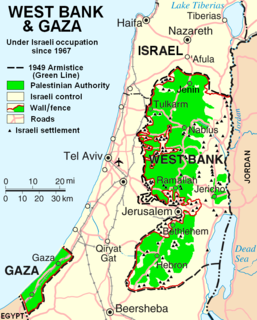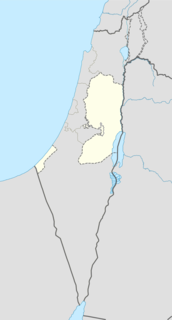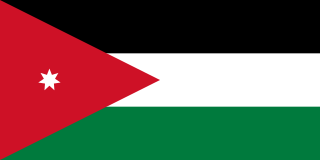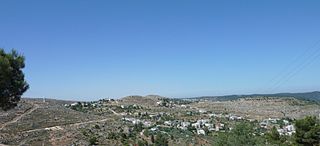Results
Semi-finals
| Home Team | Score | Away Team |
|---|---|---|
| Orthodox Club Jerusalem | 1–0 | Dajani Sports Club |
| Islamic Sport Club Jaffa | 3–2 | Shabab al-Arab Haifa |
Source: [5]
| Season | 1944–45 |
|---|---|
| Champions | Islamic Club Sport Jaffa |
1946 → | |
The 1945 Palestine Premier League was the first edition of the first tier in the Arab Palestinian football league system (organised by the APSF). The league champions and winners of the trophy, named Arab Bank Shield, was Islamic Sport Club Jaffa. [1] [2] [3]
Clubs affiliated to the APSF split into six regional leagues. The champion of each of the six regions advanced to the Palestine championship. [4]
| Home Team | Score | Away Team |
|---|---|---|
| Orthodox Club Jerusalem | 1–0 | Dajani Sports Club |
| Islamic Sport Club Jaffa | 3–2 | Shabab al-Arab Haifa |
Source: [5]

Jerusalem is a city in the Middle East, located on a plateau in the Judaean Mountains between the Mediterranean and the Dead Sea. It is one of the oldest cities in the world, and is considered holy to the three major Abrahamic religions—Judaism, Christianity, and Islam. Both Israel and the Palestinian Authority claim Jerusalem as their capital, as Israel maintains its primary governmental institutions there and the State of Palestine ultimately foresees it as its seat of power; however, neither claim is widely recognized internationally.

The Israeli–Palestinian conflict is the ongoing struggle between Israelis and Palestinians that began in the mid-20th century. Various attempts have been made to resolve the conflict as part of the Israeli–Palestinian peace process, with only partial success, as at the end of 2019.

Jenin is a Palestinian city in the northern West Bank. It serves as the administrative center of the Jenin Governorate and is a major center for the surrounding towns. In 2007 the city had a population of 39,004. Jenin is under the administration of the Palestinian Authority.

Palestine, officially the State of Palestine, is a de jure sovereign state in Western Asia claiming the West Bank and Gaza Strip with East Jerusalem as the designated capital, although its administrative center is currently located in Ramallah. The entirety of territory claimed by the State of Palestine has been occupied by Israel since the Six-Day War in 1967. Palestine has a population of 4,816,503 as of 2016, ranked 123rd in the world.
The history of the Israeli–Palestinian conflict began with the establishment of the state of Israel in 1948.

The Jordanian annexation of the West Bank was the occupation and consequent annexation of the West Bank by Jordan in the aftermath of the 1948 Arab–Israeli War. During the war, Jordan's Arab Legion conquered the Old City of Jerusalem and took control of territory on the western side of the Jordan River, including the cities of Jericho, Bethlehem, Hebron and Nablus. At the end of hostilities, Jordan was in complete control of the West Bank.

The Palestine national football team, controlled by the Palestinian Football Association, represents Palestine in association football. The squad is governed by the Asian Football Confederation (AFC) continentally, and FIFA worldwide. While Palestine is yet to qualify for the World Cup, they have participated twice in the Asian Cup: in 2015, after winning the 2014 AFC Challenge Cup, and 2019, their first time through regular qualification. They failed to get past the group stages on both occasions. Palestine's main venue is the Faisal Al-Husseini International Stadium in Al-Ram, however they have been forced to play in neutral stadiums for home matches in numerous occasions due to political issues.
The Arab League was formed in Cairo on 22 March 1945 with six members: Egypt, Iraq, Transjordan, Lebanon, Saudi Arabia, and Syria. Yemen joined on 5 May 1945.

The ongoing Arab–Israeli conflict refers to the political tension, military conflicts and disputes between Arab countries and Israel, which climaxed during the 20th century. The roots of the Arab–Israeli conflict have been attributed to the support by Arab League member countries for the Palestinians, a fellow-League member, in the ongoing Israeli–Palestinian conflict, which in turn has been attributed to the simultaneous rise of Zionism and Arab nationalism towards the end of the 19th century, though the two national movements had not clashed until the 1920s. Part of the dispute arose from the conflicting claims by these movements to the land that formed the British Mandatory Palestine, which was regarded by the Jewish people as their ancestral homeland, while at the same time it was regarded by the Pan-Arab movement as historically and currently belonging to the Arab Palestinians, and in the Pan-Islamic context, as Muslim lands.

Israel, also known as the State of Israel, is a country in Western Asia, located on the southeastern shore of the Mediterranean Sea and the northern shore of the Red Sea. It has land borders with Lebanon to the north, Syria to the northeast, Jordan on the east, the Palestinian territories of the West Bank and Gaza Strip to the east and west, respectively, and Egypt to the southwest. The country contains geographically diverse features within its relatively small area. Israel's economic and technological center is Tel Aviv, while its seat of government and proclaimed capital is Jerusalem, although the state's sovereignty over Jerusalem has only partial recognition.

Beit Hanina is a Palestinian neighborhood in East Jerusalem. It is on the road to Ramallah, eight kilometers north of central Jerusalem, at an elevation of 780 meters above sea level. Beit Hanina is bordered by Pisgat Ze'ev and Hizma to the east, Ramot, Ramat Shlomo and Shuafat to the south, Beit Iksa and Nabi Samwil to the west, and Bir Nabala, al-Jib, Kafr Aqab and ar-Ram to the north.

Al-Walaja or al-Walaja is a Palestinian village in the West Bank, four kilometers northwest of Bethlehem City. It is an enclave in the Seam Zone, near the Green Line. Al-Walaja is partly under the jurisdiction of the Bethlehem Governorate and partly of the Jerusalem Municipality. According to the Palestinian Central Bureau of Statistics, the village had a population of 2,041 mostly Muslim inhabitants in 2007. It has been called 'the most beautiful village in Palestine'.

Silwan is a predominantly Palestinian neighborhood on the outskirts of the Old City of Jerusalem. Forty Jewish families also live in the area. Silwan is located in East Jerusalem. Silwan began as a farming village, dating back to the 7th century according to local traditions, while the earliest mention of the village is from the year 985. From the 19th century onwards, the village was slowly being incorporated into Jerusalem until it became an urban neighborhood.
The sport of football in the country of Palestine is run by the Palestinian Football Association. The association administers the national football team as well as the West Bank Premier League. They are members of FIFA and the Asian Football Confederation. Women's football is popular also in Palestine. The opening match of the Palestine Women's National Football League on February 10, 2011, in the Feisal al-Husseini Stadium was attended by an estimated 8,000 people. The Women's league has six teams. Football is the most popular sport in Palestine. Honey Thaljieh is a pioneer in women's football
Racism in the Palestinian territories encompasses all forms and manifestations of racism experienced in The Palestinian Territories, of the West Bank, Gaza, and East Jerusalem, irrespective of the religion, colour, creed, or ethnic origin of the perpetrator and victim, or their citizenship, residency, or visitor status. It may refer to Jewish settler attitudes regarding Palestinians as well as Palestinian attitudes to Jews and the settlement enterprise undertaken in their name. In Joseph Massad's view, Zionism often takes Palestinian resistance to Jewish settlement of their land as itself anti-Semitic.

Mandatory Palestine was a geopolitical entity established between 1920 and 1923 in the region of Palestine under the terms of the "Mandate for Palestine".

The two-state solution to the Israeli–Palestinian conflict envisages an independent State of Palestine alongside the State of Israel, west of the Jordan River. The boundary between the two states is still subject to dispute and negotiation, with Palestinian and Arab leadership insisting on the "1967 borders", which is not accepted by Israel. The territory of the former Mandate Palestine which did not form part of the Palestinian State would continue to be part of Israel.
1946 Palestine Premier League was the second edition in the first tier in the Arab Palestinian football league system, organized by the APSF. The champion was Shabab al-Arab Haifa, defeating Islamic Sports Club Jaffa in the final to win its 1st title.
The 1947 Palestine Premier League was the third edition of the first tier in the Arab Palestinian football league system, organized by the APSF. The champion was Shabab al-Arab Haifa, defeating Islamic Sports Club Jaffa 5–1 in the final, which was played in Jerusalem and winning the trophy for the second time in a row. This was the last edition of the Palestine Premier League before the 1948 Arab–Israeli War.
The Arab Palestine Sport Federation was a governing body of sport activities for Palestinian Arabs in Mandatory Palestine. The federation was active between 1931 and 1937 and between 1944 and 1948. It organized a variant of activities in various sports, mostly in football, Boxing and Weightlifting.